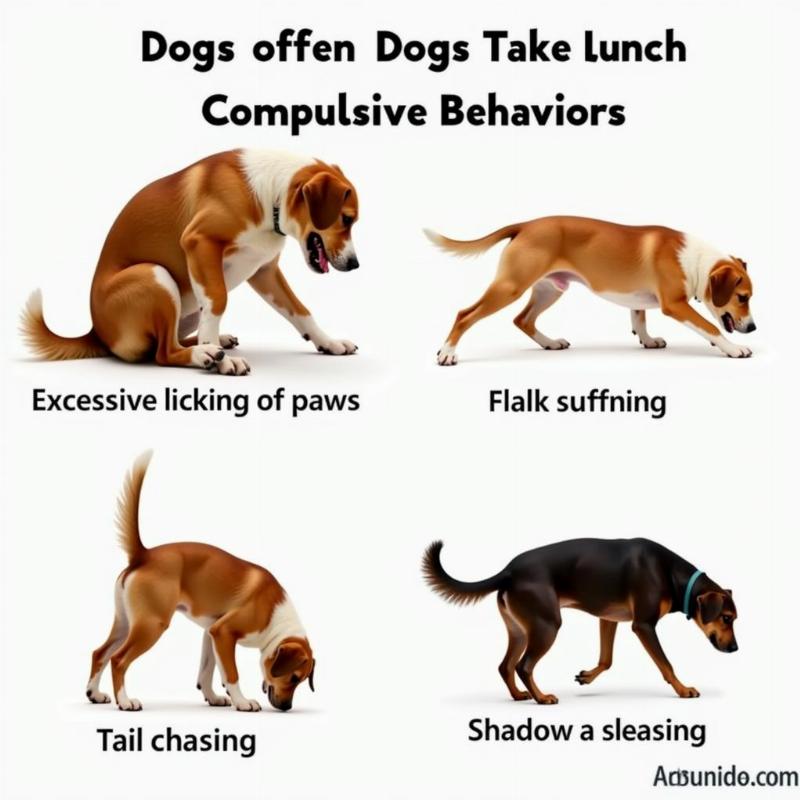Obsessive-compulsive disorder (OCD) in dogs, like in humans, manifests as repetitive behaviors performed out of an apparent need, rather than enjoyment. While a playful dog might chase its tail occasionally, a dog with OCD might chase its tail relentlessly, to the point of self-harm. If you’re wondering, “Does my dog have OCD?” this article aims to provide valuable insights and guidance. This isn’t a substitute for professional veterinary advice, but it can help you understand canine OCD and whether your dog’s behavior warrants a vet visit.
Understanding Canine Compulsive Disorder
Canine Compulsive Disorder (CCD), often referred to as OCD, involves repetitive, seemingly pointless behaviors that dogs perform excessively. These actions often stem from underlying anxiety or stress. While normal dog behaviors like tail chasing or licking can be playful and sporadic, compulsive behaviors are persistent, exaggerated, and interfere with the dog’s daily life. Recognizing the difference between normal play and compulsive behavior is crucial in addressing potential OCD. Factors like genetics, environment, and breed predisposition can influence the development of CCD.
 Examples of Canine Compulsive Disorder
Examples of Canine Compulsive Disorder
Common Canine Compulsive Behaviors
Several behaviors can indicate potential CCD in dogs. These include:
- Excessive licking: This can involve constant licking of paws, flanks, or other body parts, often leading to hair loss and skin irritation.
- Tail chasing: While occasional tail chasing is normal, persistent, frantic chasing can be a sign of CCD.
- Flank sucking: This involves a dog obsessively sucking on its flank or side.
- Shadow chasing or light chasing: Dogs with this compulsion will fixate on and chase shadows or moving lights.
- Spinning: Repetitive spinning in circles can also be a compulsive behavior.
- Pacing: Constant pacing back and forth, especially in a confined space, can suggest anxiety and potential CCD.
Does Your Dog’s Behavior Warrant a Vet Visit?
If your dog exhibits any of the behaviors mentioned above with unusual frequency or intensity, it’s essential to consult a veterinarian. They can properly diagnose CCD and rule out any underlying medical conditions that might be contributing to the behavior. Early intervention is key in managing CCD effectively.
Is There a “Does My Dog Have OCD Quiz”?
While there isn’t a definitive online quiz that can diagnose canine OCD, observing your dog’s behavior and answering some key questions can help you determine whether a veterinary consultation is necessary. Consider these points:
- Frequency: How often does your dog engage in the repetitive behavior?
- Intensity: Does the behavior seem excessive or frantic?
- Duration: How long does each episode last?
- Interruption: Can you easily interrupt the behavior, or does your dog seem fixated?
- Impact on daily life: Does the behavior interfere with your dog’s eating, sleeping, or social interactions?
If you answer “yes” to several of these questions, it’s strongly recommended to seek professional veterinary advice.
Managing Canine OCD
Managing canine OCD typically involves a combination of behavior modification techniques, environmental enrichment, and sometimes medication. A veterinarian or a certified veterinary behaviorist can develop a tailored treatment plan for your dog’s specific needs.
Conclusion
While a simple “does my dog have OCD quiz” might not exist, understanding the signs of canine compulsive disorder and observing your dog’s behavior can help you identify potential issues. If you suspect your dog might have OCD, consulting a veterinarian is crucial for proper diagnosis and developing an effective management plan. Early intervention can significantly improve your dog’s quality of life.
FAQ
- What is the difference between normal dog behavior and OCD? Normal behaviors are typically playful, sporadic, and easily interrupted. OCD behaviors are excessive, repetitive, and difficult to interrupt.
- Can any dog develop OCD? While some breeds are predisposed, any dog can potentially develop OCD.
- Is there a cure for canine OCD? While there’s no cure, OCD can be effectively managed with appropriate treatment.
- What should I do if I think my dog has OCD? Consult a veterinarian for a proper diagnosis and treatment plan.
- Can training help with canine OCD? Yes, behavior modification techniques can be very helpful in managing OCD.
- Are there medications for canine OCD? In some cases, medication may be prescribed as part of a comprehensive treatment plan.
- How can I prevent my dog from developing OCD? While prevention isn’t always possible, providing a stimulating environment and minimizing stress can help.
About Beautdogs.us
Beautdogs.us is your leading resource for comprehensive dog care information, breed-specific guidance, and access to premium products and services tailored to the needs of dog owners in the US. Whether you’re a seasoned dog owner or just starting your journey, Beautdogs.us provides expert advice and insights to help you navigate every aspect of dog ownership, from health and nutrition to training and behavior. Contact us today for personalized support and discover how we can help you enhance your dog’s well-being. Email: [email protected], Phone: +1 501-555-7529.